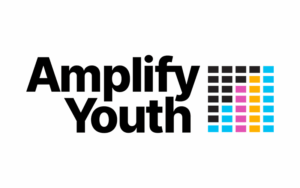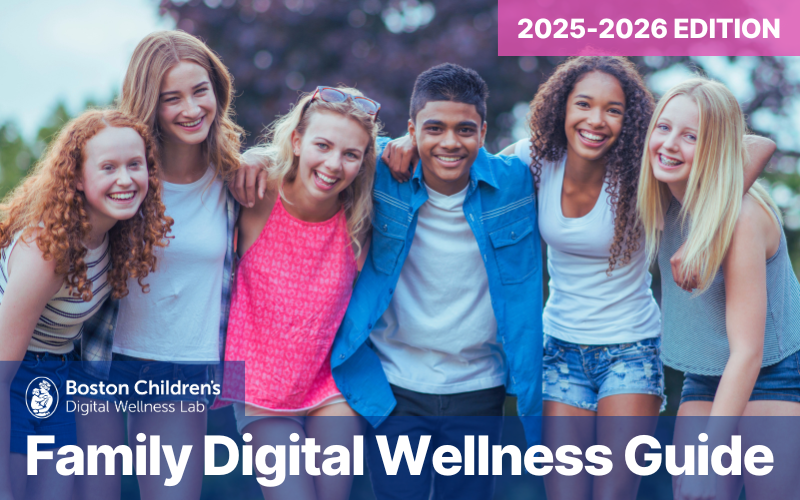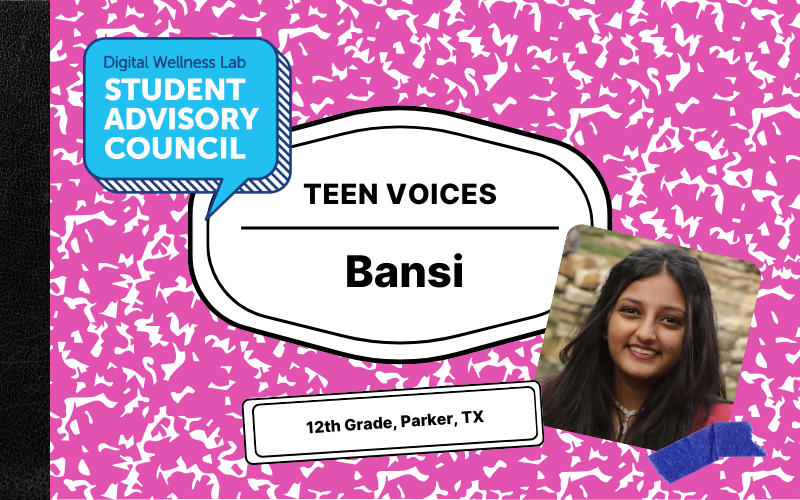Bansi, a member of our 2023-24 Student Advisory Council, shares her point of view on the opportunities and challenges with technology, and how this impacts youth mental health.
What does a “day in the life” look like for you with using technology and digital media?
Technology plays a major role in my school day with most of my assignments, research, and references all revolving around my laptop. I think this represents one of the most beneficial aspects of technology as it can increase access to new information and ideas. Given that I am in my senior year of high school with most required coursework completed and college applications finished, I have a lot more free time this year. Admittedly, I use a lot of this free time on social media and screens overall, but I am actively trying to cut that down and find more fun, productive ways to spend my last year in high school.
“As someone who has always been deeply passionate about political issues, it is always so inspiring to see the ways in which young people advocate for themselves and others.”
What are your favorite platforms/apps and why?
My personal favorite social media platform is Instagram for two reasons. The first reason is that it is a great way to catch up with friends. I have a lot of friends who I don’t get to see that often because of different class schedules, but I can always keep up with what they’re posting and putting on their story. You can also have a fully private account on Instagram, which I did for a while, making it really easy to only connect with friends. The second reason is I have noticed the ways in which a lot of young people mobilize their platforms to speak on sociopolitical issues, no matter the size of their platform. For example, I live in a red state and when Roe v. Wade was overturned, I remember a lot of my friends posting and sharing resources for people assigned female at birth to still be able to get medical care. As someone who has always been deeply passionate about political issues, it is always so inspiring to see the ways in which young people advocate for themselves and others.
What are the greatest opportunities you see for teens when it comes to using technology?
I think some of the greatest opportunities for teens when using technology is finding like-minded people. This can be in many facets like finding representation for an ethnic or cultural identity, discovering queer community, or even just seeking out people with similar interests. There is such a rich and vast community of people on the internet, and, as long as teens are being safe and keeping their grownups in the loop, it really can be a fantastic way to encounter people who are similar to you through simple, accessible means like comments, follows, and messaging.
“There are a myriad of personal, as well as larger social issues, that affect youth mental health. When adults paint all of these issues as stemming only from social media, it can become invalidating, even when there are good intentions behind it.”
What are the greatest challenges you see for teens when it comes to using technology?
The media that young people consume is inevitably going to affect their ways of thinking. And, while there is so much positive, uplifting content out there, there is also an incredibly hateful side of the internet. One harmful thing I have seen a lot of recently is the diet culture side of social media where rather than providing safe, healthy tips, “fitness influencers” advocate incredibly dangerous methods of weight loss to audiences of primarily young girls. And that is just one example, there are so many similarly harmful sides of the internet. I would say one of the greatest challenges of being a teen on technology is finding the positive sides of the internet while shutting out the negative ones.
What are the greatest opportunities you have and challenges you personally face when it comes to managing your technology use?
As someone who has managed social media for a few nonprofit organizations, I have seen firsthand how technology presents an incredible opportunity to empower young people to get educated and advocate for issues they care about. Young people have always had the power to affect real, meaningful change, and social media makes getting involved easier than ever. However, as just a young person on the internet, I have also seen the challenge of young people comparing themselves to Photoshopped, perfectly curated snapshots of other people’s lives. This can be so damaging to people’s mental health, especially if they are struggling and feel alone because everyone else seems to be doing so great on their Instagram feeds.
“In no way am I advocating for censorship or blocking free speech, but I think technology would be safer for teens if hateful content wasn’t actively pushed out to young people.”
What would you want to see changed or redesigned for technology and/or media to be healthier for teens?
I have noticed that a lot of social media platforms seem to be saturated with a lot of outright hateful content with little work being done to take it down when reported. One site that I personally noted as seeming to have particularly hateful content was YouTube Shorts as I would consistently get recommended incredibly hateful misogynistic and anti-LGBTQ videos and even advertisements. As a queer woman, this was understandably upsetting, but the thing that really bothers me is knowing how many young, impressionable kids use YouTube Shorts that are likely exposed to such content often. In no way am I advocating for censorship or blocking free speech, but I think technology would be safer for teens if hateful content wasn’t actively pushed out to young people.
What, if anything, do you think parents and caregivers are missing when it comes to understanding how teens use media?
It has become clear to a lot of parents and caregivers that we are currently amidst somewhat of a mental health crisis among youth with rates of mental illness and suicide showing alarming increases. I think a lot of parents and caregivers have the inclination to automatically blame all of this on social media. While I can completely understand and empathize with this, I think it can be unhelpful and leave out a lot of the story. There are a myriad of personal, as well as larger social issues, that affect youth mental health. When adults paint all of these issues as stemming only from social media, it can become invalidating, even when there are good intentions behind it.
What guidance or advice do you have for parents and other caregivers to help teens to build and maintain healthy behaviors around digital media and technology?
I would say that one of the first and most important steps is just to have open, honest communication around it. There needs to be dialogue at home about the dangers of the internet and how to use it responsibly. I would encourage trying to stay away from judgment and condescension in this dialogue and lean more towards education and understanding. The fact of the matter is that your teen is likely going to be using technology in their adolescence in some aspect, and instead of resenting that fact, I think being open to it and understanding that it can be done in a healthy, productive manner can be helpful.
Bansi is a member of the Digital Wellness Lab’s 2023-24 Student Advisory Council. She is a high school senior in Parker, Texas. Previously, Bansi published a research paper titled “The Model Minority Myth: Effect on Asian American Mental Health,” which you can read here.
Here at the Lab, we welcome different viewpoints and perspectives. However, the opinions and ideas expressed here do not necessarily represent the views, research, or recommendations of the Digital Wellness Lab, Boston Children’s Hospital, or affiliates.








